Prince William's Conservation Award Winners Speak Out on His Impact: He Honors 'Unsung Heroes' (Exclusive)
The Prince of Wales helped reward the latest Tusk conservation heroes — including someone who helps save the 'hippy ape' — on Monday night
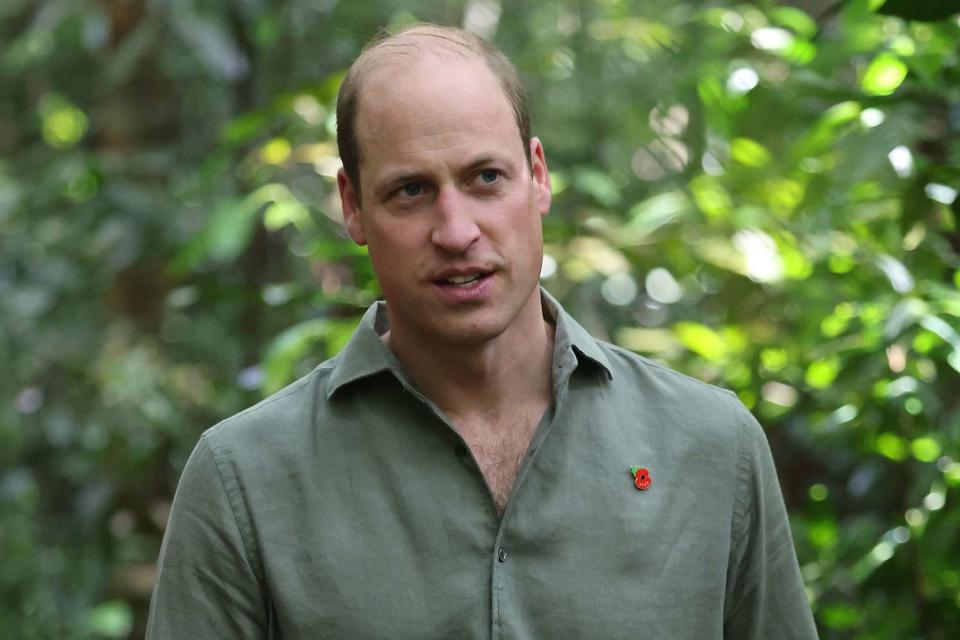
Chris Jackson/Getty
Prince William in Singapore earlier this monthPrince William is bringing heroes out of the shadows.
Winners of the 11th Tusk Conservation Awards, held Monday at The Savoy in London, tell PEOPLE exclusively how the Prince of Wales, 41, is helping shine a light on the often-dangerous world of wildlife preservation.
“The Tusk Conservation Awards paint an important picture for the many unsung heroes on the frontlines of conservation, recognizing the huge importance of their work," says Jealous Mpofu, who won the Tusk Wildlife Ranger Award. The Chief Tracker at Painted Dog Conservation in Zimbabwe tells PEOPLE, "It also encourages all of us in the field to continue doing this great work of conservation for painted dogs and other species at large.”
The award was given following Mpofu's 25 years of dedication to the sub-Saharan wild dogs. He says the award will help him further “raise awareness of the plight of painted dogs, as the reality is, if we don’t do something to help them now, these beautiful animals will be lost to humankind.”
Tusk's CEO Charlie Mayhew, a longtime collaborator with the Prince of Wales on conservation, tells PEOPLE that William's "active involvement and support for Tusk has been invaluable to us as a charity but also for African conservation as a whole."
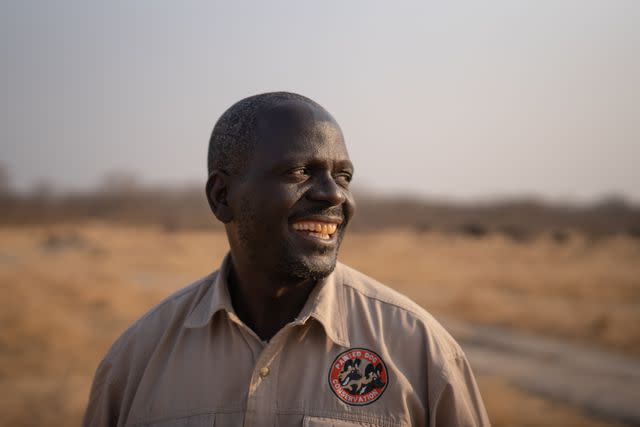
Tusk conservation awards
Jealous Mpofu, who won the Tusk Wildlife Ranger awardRelated: Prince William Is a ‘Beacon’ for Worldwide Environment Mission, Says Robert Irwin (Exclusive)
Prince William chose Tusk as one of his patronages as he began his public life soon after graduating from university in 2005. For the last 11 years, he's led the charity in its awards which aims to shine a spotlight on the careers and achievements of conservation heroes and wildlife rangers across Africa.
Noting that the 19th anniversary of that commitment is next year, Mayhew adds that William “has provided immense value to conservation over the years, raising awareness for endangered species and the communities that live alongside them, as well as personally visiting a number of Tusk’s partner projects to witness the impact of our network’s efforts on the ground.”
Prince William has also taken the message around the world—including in meetings with former President Barack Obama and with President Xi Jinping of China, as well as at the Earthshot Prize awards in Boston and Singapore.
"He has also been instrumental in communicating the importance of tackling the illegal wildlife trade on a global platform,” Mayhew adds.
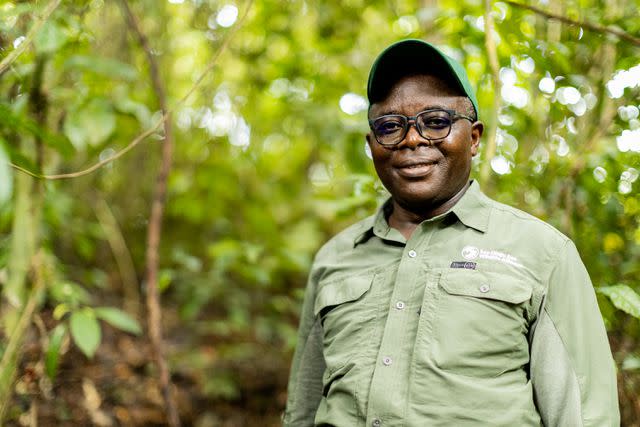
Anthony Ochieng/Tusk conservation awards
Ekwoge Abwe, who won the Prince William Award for Conservation in AfricaEkwoge Abwe from Cameroon won the Prince William Award for Conservation in Africa. He is the co-hub leader and program manager at San Diego Zoo Wildlife Alliance and President of the Cameroon Biodiversity Association. It rewarded him and his team for their work with the local communities around the Ebo forest.
He says, “The potential impact of our programs on human attitudes, behavior, biodiversity persistence and climate regulation has a global scope.”
The forest doesn’t have any legal protection and has suffered from threats ranging from hunting and the bushmeat trade to habitat loss through logging and the expansion of agro-industrial plantations, he says. But they have encouraged the communities to see themselves as “the custodians of the rich biodiversity of the forest, which is home to a unique population of gorillas and tool-wielding chimpanzees, in which they take enormous pride.”
Supported by the San Diego Zoo Wildlife Alliance, his team community-led conservation in communities around the Ebo forest, including supporting the Gorilla Guardians and Chimpanzee Guardians, which engage in alternative sustainable livelihood activities to reduce dependence and pressure on the wildlife and their forest habitat.
He tells PEOPLE, “We realized from the onset that conservation in this landscape could only be achieved through close collaboration with the communities whose history and ancestry are intricately linked with the wildlife and forest; those who call it home.”
Related: Prince William Is Asked How Much Money Is in His Bank Account — and Gives a Surprising Answer!
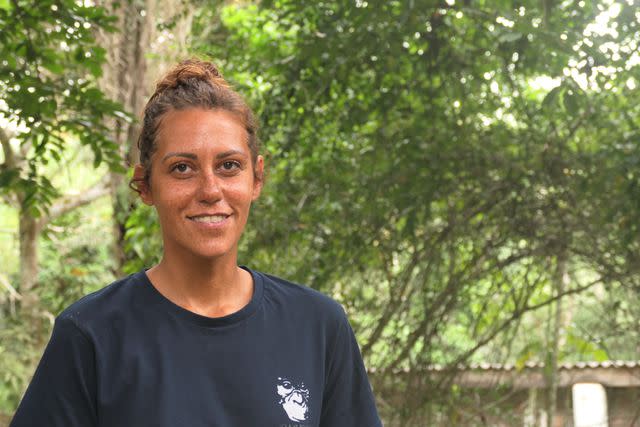
Tusk conservation awards
Fanny Minesi from the Democratic Republic of the CongoFanny Minesi is the General Director of the Amis des Bonobo du Congo (ABC) —Friends of Bonobos of Congo — in the Democratic Republic of the Congo and won the Tusk Award for Conservation in Africa. Saving the Bonobos, which are humans’ closest genetic relatives along with chimpanzees as they share 98.7% of our DNA, is crucial.
"Poaching is one of the biggest challenges facing bonobos,” Minesi tells PEOPLE. ”Our sanctuary, Lola ya Bonobo, takes in baby bonobo orphans confiscated from poachers who are often hired by criminal wildlife traffickers. As many as 10 adult bonobos die for every baby we rescue. The adult bonobos become food, and the babies and toddlers are sold into the illegal international wildlife trade.”
The organization also returns bonobos to the wild. Bonobos live only in one part of the Democratic Republic of Congo, and they are highly endangered.
“Unlike chimps, bonobos are matriarchal and more likely to share food than fight over it. The females lead, and they form coalitions to manage male aggression. Bonobos are very intelligent and emotionally aware,” Minesi explains. “They are sometimes called 'the hippie ape' because they 'make love not war,' and have frequent social-sexual contact. Scientists see them as a key to understanding human evolution.”
“The Congo Basin forests are the second lung of the earth. They store billions of tons of carbon and are a linchpin in global climate stability,” Minesi tells PEOPLE. “And bonobos are the “gardeners of the forest.” They eat lots of fruits and vegetables, distribute the seeds, and help to generate new tree growth. The health of these forests is important to everyone, no matter where you live.”
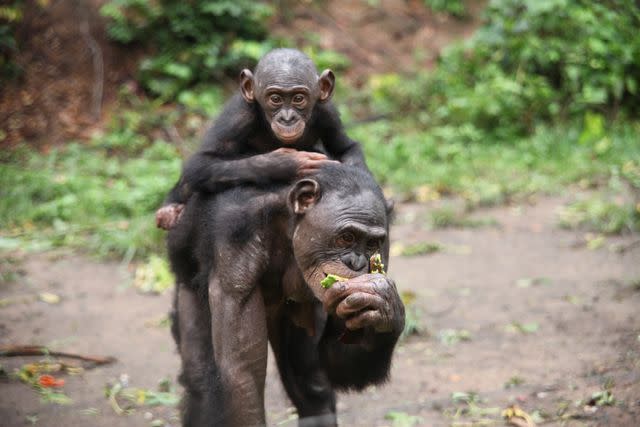
Friends of Bonobos Congo/Tusk conservation awards
An adult and baby bonoboCan't get enough of PEOPLE's Royals coverage? Sign up for our free Royals newsletter to get the latest updates on Kate Middleton, Meghan Markle and more!
Meanwhile, Mpofu says that preserving the painted dogs is not only crucial for the species, but for the wider region’s biodiversity. They “are a key indicator species for a healthy ecosystem, as changes in their population dynamics or health may signal broader issues within the environment, such as disease outbreaks or habitat degradation,” he says.
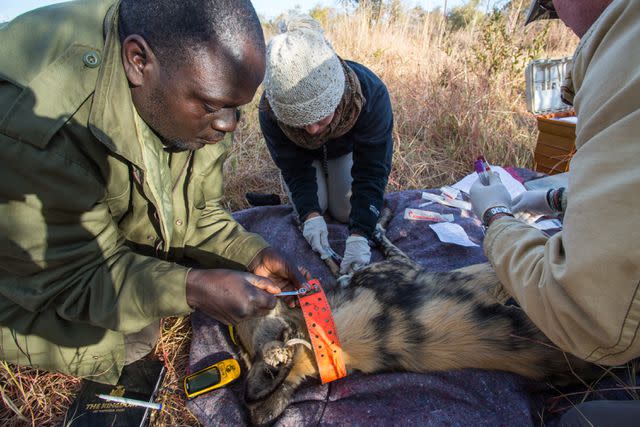
Burrard-Lucas/Tusk conservation awards
Jealous Mpofu -- seen here working to help the painted dogs -- was honored at the Tusk Awards on Monday night“Through hunting, they eliminate the weak and sick animals, breaking the disease chains and helping balance the ecosystem."
Mpofo says he has become used to the danger as he patrols an area of Hwange National Park. “I have always lived next to wildlife, growing up we used to see wildlife coming out of the park into our community. I have always found painted dogs fascinating,” he says. “Since working with them I have often stayed in the bush for days when monitoring the packs until I see them, particularly if there is an injured dog in the pack. They have become my dogs, and I know each one as an individual.”
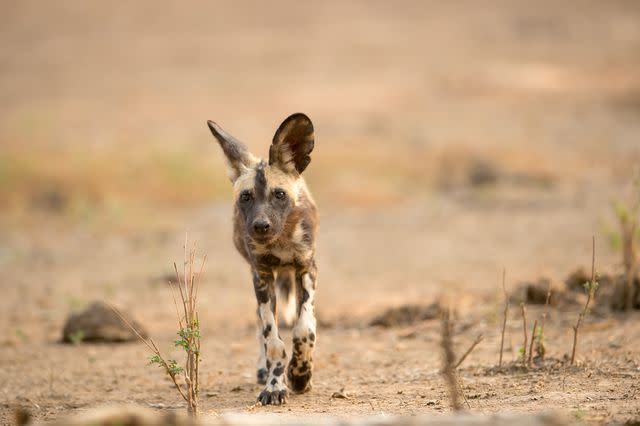
Tusk conservation awards
A painted dog which Jealous Mpofu works to help protectFor more People news, make sure to sign up for our newsletter!
Read the original article on People.